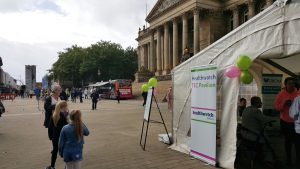Tech care of your health!
It’s no secret that the NHS has had a tricky past with technology. Just this year, we saw malicious software cripple 61 trusts across England and Scotland! However, the demands of an ageing population and the shift in the supply of healthcare professionals has meant that tech-enabled care is needed quickly to alleviate pressure from the bed blocking phenomenon.
As part of the devolution of health and social care in Greater Manchester, a Bolton locality plan set out how healthcare services would change over the next five years. This plan looks to introduce technology such as a push button, or fall sensors and alarm pendants worn around the neck, that can allow patients to safely go back to their own homes, rather than staying in hospital longer than necessary.
A Tuesday evening meeting with the Bolton Borough Youth Council reminded me of my fond memories as a Youth Councillor. I used the session to gather young people’s voice on current service issues as well as to introduce aspects of the locality plan. Within the last two years, since I was kicked out of the youth council for being too old, a lot has changed. The new group had managed to take on, even more, projects and even acquired a new fancier place of meeting. I wish I was two years younger! Seeing the continuous change in the social and cultural habits of the younger millennials, I finished up my time-slot by discussing how the Youth Council could actively work with HealthWatch to support their health research work. This is something that I will be following up with in due course.
To ascertain feedback, so that the locality plan could be adjusted to make the towns healthcare services fit for the future, HealthWatch helped run a community roadshow in the centre of Bolton. In a large white tent, you could find a team of eager HealthWatch researchers looking to learn your opinions on the £28.8 million plan for Bolton’s health and social services.
Naturally, I played the role of Dr Patel giving shoppers the chance to experience a simulation of video-call GP appointments. To ensure that this was nothing more than a simulation, I wrote up fixed scenarios that could be acted out by the willing patient. To my surprise, the majority people thought positively about this issue and not one person mentioned the need for additional safeguarding. Whilst I was off-duty, I supported the work of my colleagues by collecting people’s opinions on wearable and home monitoring technology. Undeterred by unpolished Gujarati and Hindi language skills, I managed to discuss concerns that some of the elderly minority population had.
In this third week at HealthWatch Bolton, I’ve sadly had little time to work with the BRASS (Befriending Refugees and Asylum Seekers) Centre. Instead, I visited the Victoria Hall Refugee and Asylum Seeker meeting place to collect more data. I got the scary feeling that for some people; I was the first friendly face, with which they felt comfortable enough to talk through their problems with, that they had come across since their resettlement.
